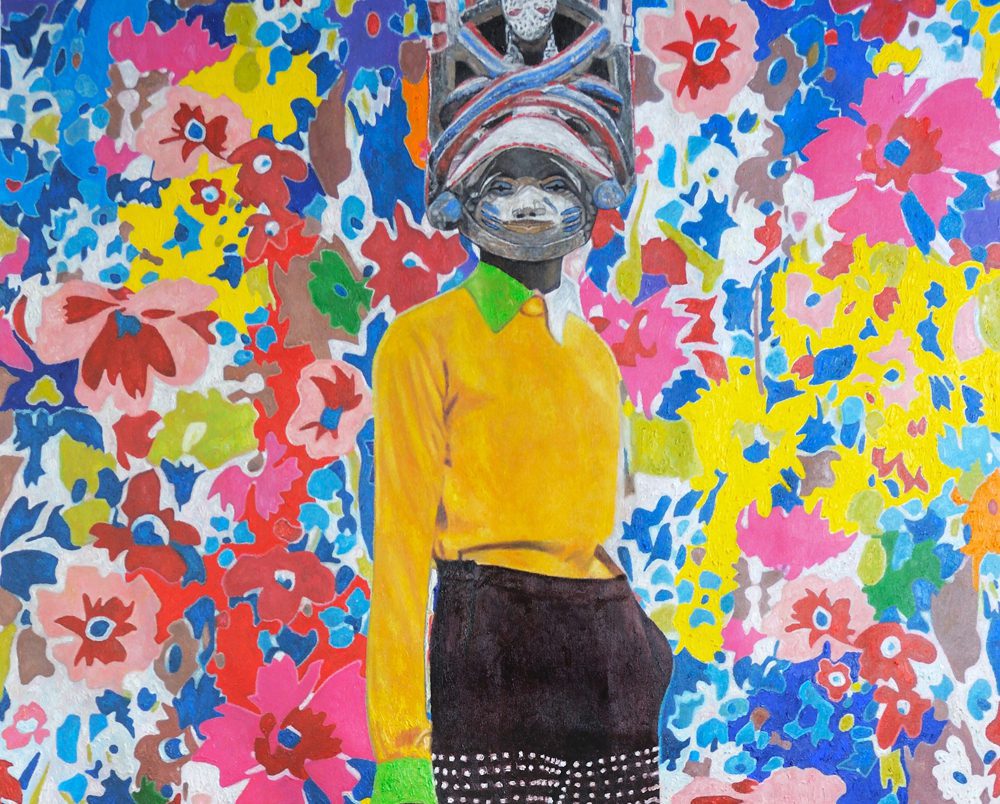Ed Cross Fine Art, London, United Kingdom
17 Jan 2018 - 21 Jan 2018

Wole Lagunju, Attitude Rocking, 2017, Oil on canvas, 70.5 x 49.5 inches. Courtesy: the artist and Ebony / Curated, Cape Town
Ed Cross Fine Art exhibits new works by the artists Shiraz Bayjoo and Wole Lagunju, curated by Katherine Finerty for the Art Projects section of The London Art Fair 2018. This eclectic selection of mixed media works invites viewers into an intimate domestic space that explores how portraiture and the decorative arts can be experienced within a uniquely contemporary and decolonising context.
Shiraz Bayjoo’s nostalgic, watery compositions of Indian Ocean islands, missionary ships, and marine wildlife are set within Rococo and Victorian style frames, harking back to the complicated historical origins of African island nations. His recent body of work addresses the complex colonial legacy of his birthplace, the Indian Ocean Island of Mauritius, through a multi-layered practice that activates a multi-cultural reality. Nautical archival images are photo transferred delicately onto boards with an ethereal application of acrylic paint sealed by smooth, glossy resin. These surfaces are then sealed with reclaimed or cast frames in Rococo and Victorian styles referencing the Dutch, French, and then British colonial possession of Mauritius throughout the 17th to 20th centuries. The overall effect is of memories transferred and stilled – fragile symbols held in handsome frames that represent both sentimentality and violence. The salon style hang takes direct inspiration from the Wallace Collection’s intimate Boudoir Cabinet, whereminiature paintings and luxury items from the 17thand 18th centuries can be discovered within the grand house museum. This suggestion of a domestic and interactive space is further encouraged by an installation of Bayjoo’s reclaimed furniture with pieces from his En Famille (2015) series, featuring archival images of house servants who are symbolically re-acknowledged and given venerated resting places within wooden jewellery trays from the personal collection of the artist’s aunt. Like his more recent works, these multi-media pieces acknowledge the historical contexts around colonised movement, bodies, and memories, whilst ultimately reclaiming their voices and de-victimising their presentations. The artist explains: “My works explore the tensions and dialogues that arise through processing the emotive icons of disappearing and fracturing cultural and religious identities through the language and gestures of abstraction”.
Wole Lagunju’s vibrant hybrid portraits liberally mix Yoruba art forms such as Gelede masks and indigo adire textiles with Western fashions throughout history (from the repressed Elizabethan era to more liberated 1960s countercultures) in order to interrogate distinct visual languages of cultural hierarchy and identity. Both artists create composite objects mixing the past with present and occupy a space that is at once personal yet collective – decorative yet full of hidden layers, meanings, and stories. His newest series of small-scale portraits comprise a community of diverse profiles, masks, and ‘gauche chics’ full of enigmatic character and subtle seduction. They present intimate and interpretive moments of personal engagement and self-reflection, in contrast to his more imposing, larger-scale paintings of hybrids figures topped off with elegant Yoruba Gelede masks whilst donned in Elizabethan era or 1960s style dress. These cross-cultural representations interrogate Western history’s racial, gender, and socio-political hierarchies by reinterpreting iconic representations of powerful women fused with the artist’s own culturally-specific visual language. Gelede masks, for example, are activated in performances of male dancers celebrating the sacred powers of women, such as motherhood and sexuality. On the other hand, the artist explains that “the meanings associated with Gelede masks in Yoruba society are capricious and many but generally, they satirize, parodize, entertain and educate onlookers. In the same vein, my paintings also examine the foibles of imperialistic culture and its attendant shortcomings”. In a more empowering gesture, the centrepiece of this stand, Renaissance, presents a poised and powerful female figure wearing a chic shift dress colour-blocked with a bold blue that references the Yoruba textile adire – indigo-dyed cloth made by women in south-western Nigeria. In this light, the Victorian style portrait Effigy’s striking blue background and regally sinuous frock further conjures the creative art of adire, establishing a hybrid aesthetic that blurs the connotations of Western iconographic hierarchies and allows for a more nuanced, de-colonising reading.
Immersing all of these distinct works in a deep, blue background rather than a white cube seeks to summon the indigo of Lagunju’s adire and his championing of women’s craftsmanship alongside Bayjoo’s thematic imagery of water, from collective tears to the waves of globalisation. Whilst their salon style composition revives certain colonial design aesthetics, physical deviances in the forms of purposefully placed gazes and beckoning hidden artworks establish a space that questions: in what new ways may we collect objects, conjure memories, and tell stories in intimate, everyday spaces? This stand serves as a fantasy of how one might not only physically live with these art objects, but also psychologically meditate upon the historical memories they reference, and voices they may reclaim.
London Art Fair
Stand P6 – Art Projects
Business Design Centre
52 Upper Street
London N1 OQH